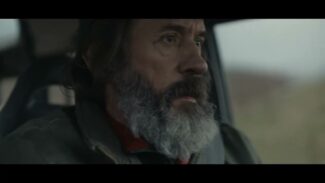Solitude (Ninna Pálmadóttir, 2023): Iceland, Slovakia
Reviewed by Sven Schubert. Viewed at the Santa Barbara International Film Festival 2024.
Despite its title, Solitude is an appeal not to live in solitude. The film makes a forceful case to build relationships. Its quiet and minimalistic setting makes that appeal ring even louder.
Gunnar (Þröstur Leó Gunnarsson), a man in his late fifties, lives by himself on an isolated farm in Iceland. He does exactly what his forebears have done over generations. His mother having died in labor and his father long dead, he is without any other family members in Iceland. His only cousin left for Canada a long time ago. His only companions are his horses.
Gunnar’s world gets turned upside down when the government decides to flood his farm to build a dam. His land is being expropriated and he finds himself to be a millionaire due to the compensation he receives from the government. But he is forced to leave his land and his animals behind.
Ill-suited for communication with other humans, he moves to the city and buys the very first apartment he is shown. He strolls around the city to discover his new surroundings, but he never speaks to anybody. And nobody speaks to him either. He passes his days in solitude.
That all changes when a young boy from the neighborhood, Ari (Hermann Samúelsson), who delivers newspapers, asks him if he wants to have a free copy. Gunnar resoundingly rejects Ari’s offer. Undeterred, Ari pushes a copy through Gunnar’s mailbox. When Gunnar wants to pay for it the next day, he makes it clear that he does not want to get another copy – and by implication any attention from Ari or the outside world. Ari keeps ignoring Gunnar’s wishes and keeps delivering papers.
Slowly, Gunnar opens up to Ari. Ari craves Gunnar’s attention and his care since his separated parents are too consumed with their own lives to pay any attention to their son. But their blissful menage-a-deux soon faces trouble.
The film was shot in the countryside of Iceland and its capital Reykjavik. Despite its stark beauty, the barren landscape (there are no trees in Iceland) and the permanent grey clouds amplify Gunnar’s loneliness as he trudges through the land. The city, Gunnar’s new home, does not fare much better. His apartment is nondescript, and his apartment building is painted in a dull grey. The long, unedited and elegiac shots show how Gunnar lives in a world that appears to be inhabited only by himself, devoid of human interaction. The pace changes when Ari appears. Suddenly, Gunnar ditches his radio program of classical music, a stand-in for his connection to the past when he still had a family, to current TV shows, representing the life that Ari has brought to his empty home.
When faced with the fundamental question if and how Gunnar wants to continue living his life, Solitudereminds us that it is worth mustering up the courage to forge human relationships. Solitude leads to disaster and Solitude succeeds in celebrating humanity.
About this entry
You’re currently reading “Solitude (Ninna Pálmadóttir, 2023): Iceland, Slovakia,” an entry on Student Film Reviews
- Published:
- 02.29.24 / 10am
- Category:
- Films, Santa Barbara Film Festival 2024

3 Comments
Jump to comment form | comments rss [?]